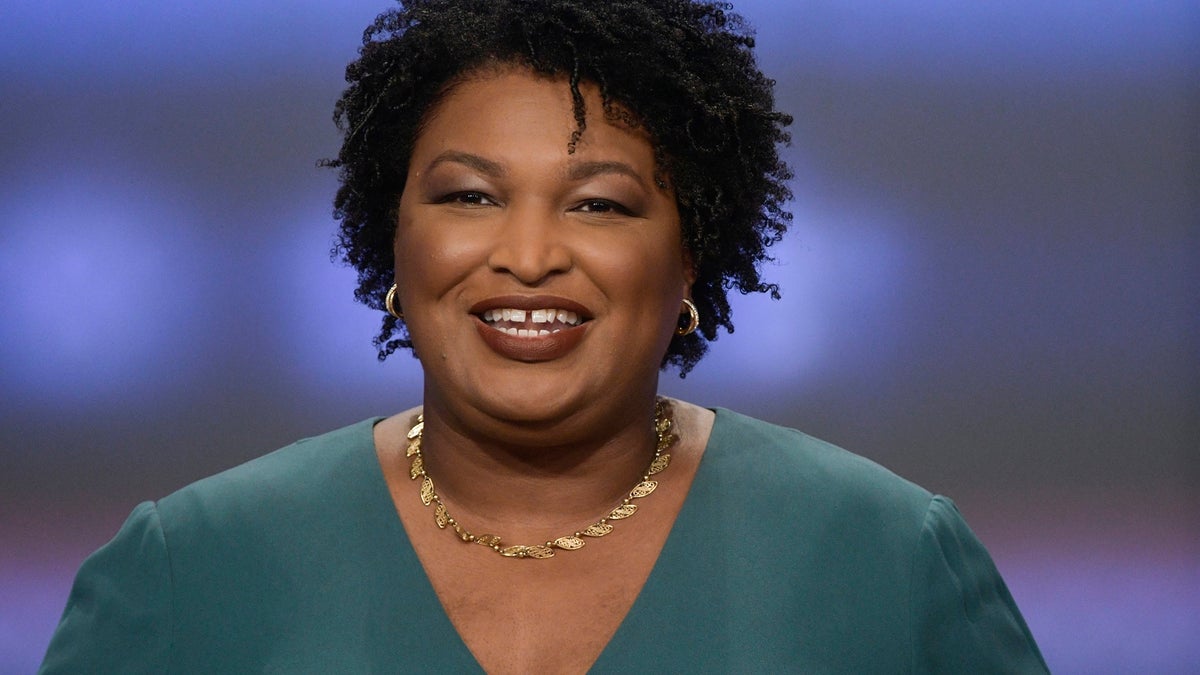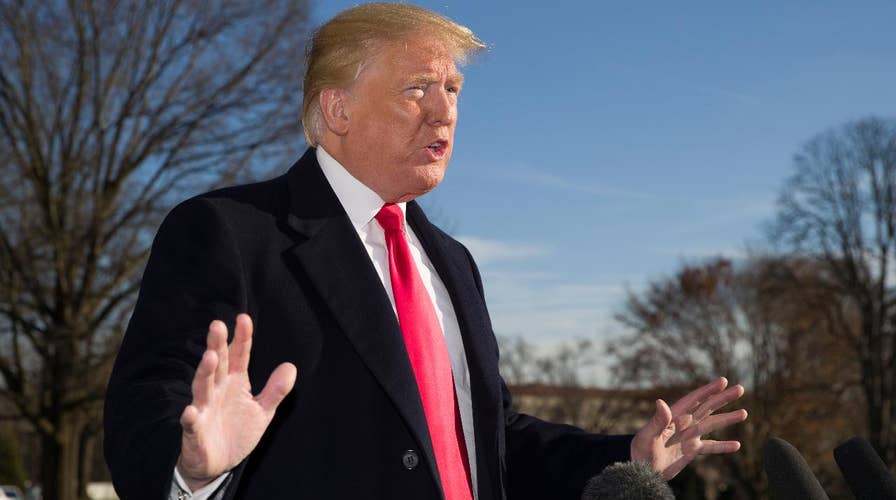President Trump is getting ready to step up to the podium for the second time Tuesday to deliver his annual State of the Union address — this time, to a Democratic majority House of Representatives.
Pelosi, D-Calif., had extended an invite to the president just hours after lawmakers formally joined the new Congress, proposing a Jan. 29 date for the annual event which is held in the House Chamber. But days later, Pelosi changed her mind, urging Trump to postpone the speech because of the partial government shutdown — the longest in U.S. history.
"Sadly, given the security concerns and unless government re-opens this week, I suggest that we work together to determine another suitable date after the government has re-opened for this address or for you to consider delivering your State of the Union address in writing to the Congress on January 29th," she said in a letter to the president.
The speaker reinforced her plea to delay the event on Jan. 23, telling Trump in a letter that she would not allow him to address the nation in the House during the shutdown.
READ: TRUMP AND PELOSI LETTERS ON STATE OF THE UNION ADDRESS
“I am writing to inform you that the House of Representatives will not consider a concurrent resolution authorizing the president’s State of the Union address in the House Chamber until the government has opened,” Pelosi wrote.
At first, it appeared Trump was going to opt for a Plan B, telling reporters "we'll do something in the alternative." But he later switched gears, announcing on Twitter that he would do the address when the shutdown is over.
"I'm not looking for an alternative venue for the SOTU Address because there is no venue that can compete with the history, tradition and importance of the House Chamber. I look forward to giving a 'great' State of the Union Address in the near future!" Trump tweeted.
Pelosi agreed to reschedule the event on February 5 at 9 p.m. ET.
Here's what you need to know about this year's event.
What will Trump discuss?
Similarly to 2018, Republican and Democratic lawmakers are yet again at an impasse over Trump's proposed border security.
The government was partially shuttered — with about one-quarter of government employees affected — ahead of Christmas because Congress couldn't strike a deal in regards to funding for Trump's border wall. Trump, in particular, requested a package that contains $5.7 billion to help build the structure along the U.S.-Mexico border.
Immigration was also a hot button issue last year.
WHAT HAPPENS DURING A GOVERNMENT SHUTDOWN? 7 THINGS YOU SHOULD KNOW
The government shut down for three days in late January 2018 over disagreements over the future of the Deferred Action for Childhood Arrivals (DACA) program, an Obama-era program, which offers protection for immigrants — also known as "Dreamers" — who came into the U.S. illegally as minors. They eventually reached a compromise to briefly reopen the government.
During his 2018 address, Trump called on both parties to put politics aside and "get the job done," a theme he may echo this year as Democrats control the House while Republicans maintain their grip over the Senate.
“Tonight, I call upon all of us to set aside our differences, to seek out common ground, and to summon the unity we need to deliver for the people we were elected to serve."
“Tonight, I call upon all of us to set aside our differences, to seek out common ground, and to summon the unity we need to deliver for the people we were elected to serve,” the president said.
Days later, on Feb. 9, 2018, the government once again shuttered, though that shutdown only last nine hours. Congress eventually came up with a two-year budget agreement that included an increase in military spending, an extension for the Children’s Health Insurance Program and additional funds for disaster relief, among other issues.
It's a deal "neither side loves, but both sides can be proud of," Senate Minority Leader Schumer, D-N.Y., said at the time.
White House counselor Kellyanne Conway revealed the president would use his address "to call for an end to the politics of resistance, retribution."
"He's calling for cooperation," she said.
How long will Trump's speech last?
There's no telling how long Trump's speech will last but if it's anything like last year's, expect it to run long.
STATE OF THE UNION HISTORY, RECORDS AND OTHER FUN FACTS
In 2018, Trump spoke for a record 1 hour, 20 minutes — the third-longest SOTU speech in U.S. history. Former President Bill Clinton had him beat with a roughly 1-hour, 28-minute speech and 1-hour, 24-minute speech in 2000 and 1995, respectively, according to the University of California, Santa Barbara's American Presidency Project.
Who will attend Trump's SOTU?
Trump's Cabinet, the heads of 15 executive departments, including the attorney general, members of Congress and a variety of guests — chosen by lawmakers — are also invited to attend. The nine sitting Supreme Court justices, including newcomer Brett Kavanaugh, will also be asked to view the event in person.
Members of the Joint Chiefs of Staff and senior uniformed leaders in the Defense Department who help advise the president and his staff on military matters will be invited, too.
Trump handpicked 13 guests to join first lady Melania Trump in the gallery. The official guest list was just released by the White House. Among those invited includes a woman freed from federal prison after Trump cut short her life sentence for drug offenses, a Delaware boy allegedly bullied because his last name is Trump, the family of a Nevada couple allegedly killed by a person illegally in the U.S. and more.
The tradition was started by former President Ronald Reagan in 1982.
CLICK HERE TO GET THE FOX NEWS APP
A Marine Corps. veteran, a cop, a welder and the parents of MS-13 victims were among those tapped by the president to attend last year's event.
Who's delivering the Democratic response?

Stacey Abrams will deliver the Democratic response to Trump's second State of the Union speech. (AP Photo/John Amis)
Stacey Abrams, a former Georgia Democratic gubernatorial candidate, will take the national stage to deliver a response toTrump's State of the Union address.
The Atlanta lawyer was hoping to become the first black female governor in the U.S. in November but ultimately came up short. The 45-year-old acknowledged she wouldn't be able to defeat her Republican opponent, Brian Kemp, after a 10-day dispute over votes — though she refused to publicly concede and promised to file a federal lawsuit challenging the “gross mismanagement” of the state’s elections.
Senate Minority Leader Charles E. Schumer, D-N.Y., revealed the Democratic party's choice for the rebuttal on Jan. 29, calling Abrams a "great spokesperson" and "incredible leader."
"She has led the charge for voting rights, which is at the root of just about everything else. … I’m very excited that she’s agreed to be the respondent to the president,” Schumer reportedly told a crowd of journalists after the announcement.
Who's going to be the "designated survivor"?
The "designated survivor," a precaution taken to assure continuity of the presidency, probably won't be revealed until hours before the big event.
Last year, Agriculture Secretary Sonny Perdue was tasked with the role.
Ahead of the speech, the designated survivor will be taken to a secure and undisclosed location outside of Washington, D.C., where he or she is expected to stay with Secret Service agents until the conclusion of the event. When Trump and his Cabinet members safely exit the packed House chamber, the chosen official will be allowed to return home.
It's not unusual for a lesser-known Cabinet member to be selected, as the president may point out higher-profile officials as he mentions specific tasks and initiatives in his speech.
The Associated Press contributed to this report.














































